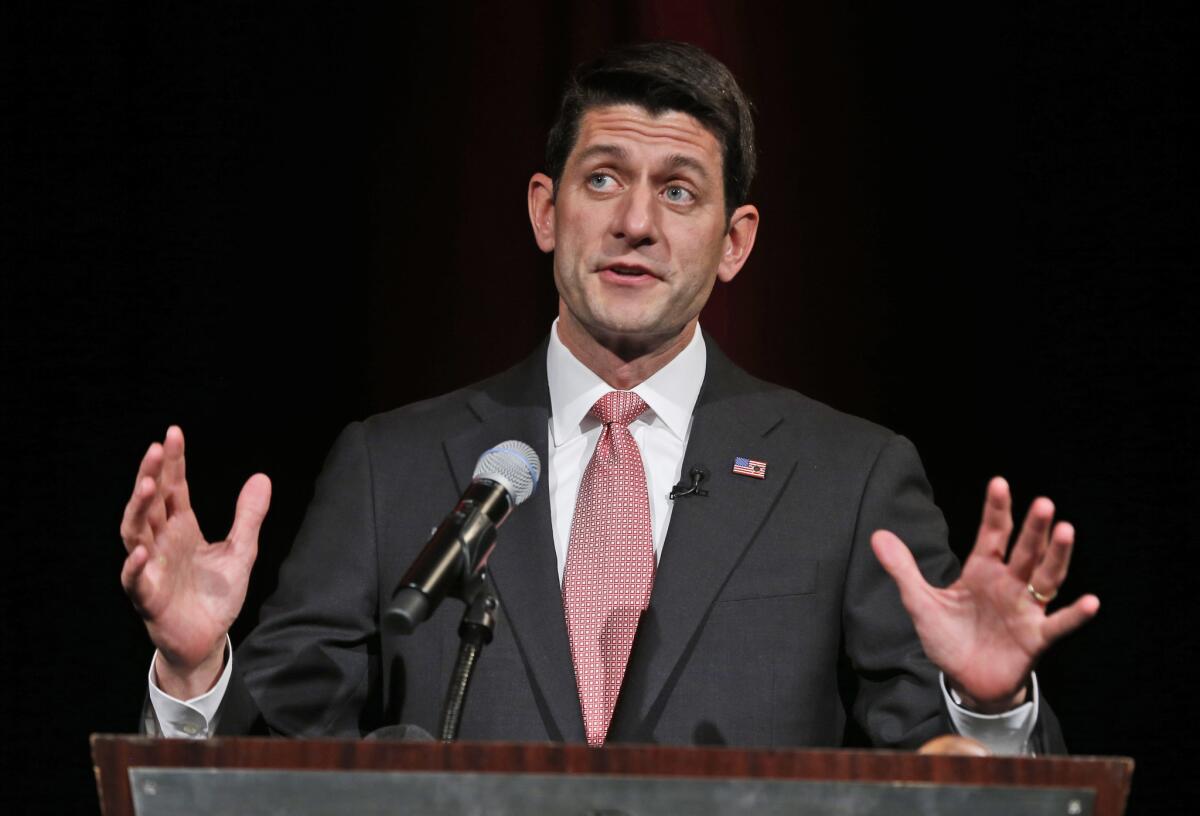The poison pill at the heart of Paul Ryan’s poverty plan

Rep. Paul Ryan (R-Wis.), this week revived his quest to be taken seriously as a “reformist” conservative (“reformicon” is becoming the preferred terminology) by releasing a position paper on refashioning the federal government’s poverty programs.
Ryan’s latest report bears some marginal improvements over his previous effort in the anti-poverty line, which we examined here, as well as his string of proposed budgets. It doesn’t propose the same wholesale slashes in the social safety net as his earlier proposals, for example. Ryan advocates increasing the Earned Income Tax Credit, one of the most effective federal assistance programs, as does President Obama.
That said, he would pay for the increase by removing benefits from some immigrant families, and treats the increase as an alternative to a hike in the minimum wage. (Responds Chuck Marr of the Center on Budget and Policy Priorities: “It takes both a strong EITC and an adequate minimum wage to ensure that work ‘pays’ adequately for those in low-wage jobs. The two policies should be seen as complements, not substitutes.”)
Ryan’s EITC expansion has garnered the greatest share of praise from suspicious progressives -- The New Republic’s Danny Vinik, perhaps the left’s leading prospector for encouraging nuggets in reformicon manifestos, calls it “Ryan’s best idea yet.” But Vinik glosses over the difference between how Obama and Ryan would pay for the raise: Obama would close corporate tax loopholes, not raid other anti-poverty programs like Ryan. And paying for this increase is the whole ballgame.
The centerpiece of Ryan’s plan is where the real danger lies. It’s a proposal to combine 11 safety net programs, including food stamps, into a single block grant to the states.
He promises the total would equal annual spending on the separate programs -- “This new, simpler stream of funding would become the Opportunity Grant, and it would be budget neutral,” he told an audience at the American Enterprise Institute this week. “The state would get the same amount of money as under current law — not a penny less.”
This is a bow to the notion of the states as laboratories of democracy, closer to the problems of their citizens and thus better equipped to deal with their problems. It’s a good sound bite, but how has it worked in the past?
The answer is, badly. The evidence from much of the country is that the states with the some of the worst poverty are also the stingiest and most uncaring about assisting their neediest citizens. One need go no further than the asinine refusal by many Republican-controlled state governments to accept the federally funded Medicaid expansion offered under the Affordable Care Act.
Some of those states have the highest ratios of uninsured citizens, especially among their poor. They haven’t done right by their citizens in medical coverage; what makes Ryan think things will be better when they have control over what were once the federal food stamp, housing assistance and child care programs? Even traditional Medicaid fares poorly in some of these states -- in Alabama, for instance, Medicaid is available for parents only if their income is 13% or less of the federal poverty level; in Texas it’s 15%. For a family of four, parents lose Medicaid once annual income exceeds $3,100 in Alabama and $3,600 in Texas.
Ryan says his block grant program wouldn’t happen until after a lengthy pilot period, and state expenditures would be monitored by federal officials to make sure the funds are being properly spent. But if the states are going to have the greater flexibility that he says is the virtue of his plan, obviously that will include the authority to exclude many of the needy.
Anti-poverty experts will pick apart the elements, fiscal, social and political, of Ryan’s plan in coming days and weeks. But its overarching flaw is a simple one. It doesn’t read like a serious effort to lift the burden of poverty from the neediest; it reads like an effort to dress up Paul Ryan as a reformer. It’s not about the needy, but about him.
Ryan claims his program is an outgrowth of the journey he has been making among poor neighborhoods and local anti-poverty activists.
But a sincere desire to assist the poor is inconsistent with his preoccupation with finding program cuts to balance program expansions, with his insistence on “budget neutral” solutions, with his supercilious, evangelical tone -- he proposes having aid recipients sign a “contract” to lift themselves from poverty, with “measurable benchmarks for success” and “sanctions for breaking the terms of the contract.”
This doesn’t sound like an anti-poverty program; it sounds like condescension.
Keep up to date with The Economy Hub by following @hiltzikm.
More to Read
Start your day right
Sign up for Essential California for news, features and recommendations from the L.A. Times and beyond in your inbox six days a week.
You may occasionally receive promotional content from the Los Angeles Times.







